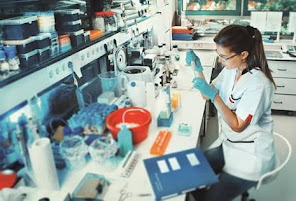Pharmaceutical Research Scientist Job: Career Overview
Research Scientist:
Research scientist deal with the process of drug discovery and testing. The entry-level job title in most pharmaceutical companies is lab technician. The work can be somewhat tedious, but a lab tech position can be an excellent way into the industry.If you've got a BS or MS degree in pharmaceutical sciences or a related discipline and have previous lab experience, either in school or in the industry, you can generally find work as a research associate. Research associates do real science, conducting experiments and analyzing data under the close supervision of more senior scientists. Research associates often have a number after their title (for example "Research Associate II") to indicate seniority level. Above the research associate is the research specialist (this title varies somewhat-it's sometimes called pharmaceuticals specialist, among other things), who generally has more autonomy and creative input into his or her research than the associate does.
PhDs who have completed their post-docs typically enter as associate scientists. In rare instances, research specialists without PhDs are promoted to this level. Associate scientists have considerable autonomy over their own research, though they collaborate fairly closely with a supervisor. The step after associate scientist is scientist-a position that involves running the lab and planning and executing large-scale research projects. Above the scientist is the senior scientist, who oversees the work of several scientists but no longer works in the lab.
Scientists at all levels have the option of leaving the research track for management-track positions. Insiders say that for employees who don't have PhDs (and don't intend to go back to school to get one), the management track holds much fewer opportunities for promotion than the non-PhD research track.
Job requirements for science positions have become more stringent as well due to higher numbers of applicants. Internship experience, advanced or specialized degrees, and proven communications and leadership skills will definitely make you a more appealing candidate. While a graduate degree isn't required to land a job, it allows greater flexibility in the job market.
Another industry trend is the move toward using the Internet and other technologies to provide interactive marketing and direct-to-patient education. Consequently, people with Internet marketing experience may find extended opportunities in Big Pharma.





Thanks for your great post. I suggest for valuable visitors to help in your pharmacy study and job preparation:
ReplyDeletePharmaTech
Pharma Elucidator
Pharma Difference
I have found that this site is very informative, interesting and very well written. keep up the nice high quality writing. Pharmacy Recruitment in Australia
ReplyDelete